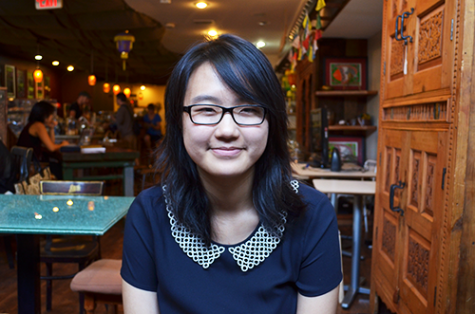Reasons to write
Zadie Smith visits campus for engaging talk
October 2, 2014
Attendees of novelist Zadie Smith’s Sept. 30 lecture as part of Writer’s Center Stage series weren’t surprised at the mix of topics featured in her talk: racism, creativity and being provocative, though they may be surprised to learn that she’s guilty of watching “New Girl” and “Key and Peele” just like the rest of us.
Both Sari Feldman, executive director of the Cuyahoga County Public Library, and Case Western Reserve University President Barbara Snyder delivered the welcome and remarks, respectively. Their speeches brought attention to the Cuyahoga Library’s dedication to literature and the local community and pointed out CWRU’s new space, made possible by the Kelvin Smith Foundation and Tinkham Veale. Professor Mark Joseph introduced Zadie Smith, praising her for her uncanny observation, fearlessness and attentiveness to details, joking that Smith was a “superhero.”
While much of Smith’s lecture dealt with themes that readers of her works are familiar with—race, social issues and a desire to be real, Smith’s presence made the event resonate.
Smith read a lecture titled, “Why write? Creativity and Refusal.” Throughout the essay, Smith jumped from historical references of the Romantics and etymology, to pop culture—citing Kanye West and Oprah as creatives.
Yet, the core of Smith’s essay wasn’t in so much about the pop culture references or the humor but rather the idea that writing isn’t for an audience, but rather for a purpose that it is new. She talked about the hipster culture who may be more in love with the mirage of the idea of the writer hunched at cafes typing away, than the act of writing itself. Smith also railed against writing as an act which satisfies an existing audience. Instead, she believed that creating and cultivating a new audience and risking displeasure, was the way to true art.
Smith also talked about racial issues such as rappers who make it, only to stand behind a white starlet who seems to legitimize the rapper and to give him approval. She says of the idea of “selling out” in her generation becomes the “consolidating of a brand” in this generation and how nowadays, the idea of creativity becomes a brand or a product to be sold. This causes people to become products, which pushes them into slots in the existing world rather than unexplored grounds.
“What else does a writer have other than sentences?” Smith asked.
She said that the act of writing, paying careful attention to sentences, is proof of our abilities, ideas and means that are uniquely our own in a world where we tend to delegate actions to others, whether it be our consciousness to activists or creativity to television writers. Writing, Smith says, “enables us to see the end of our actions – at least here, on this page.”
During the question and answer session, Smith brought up the idea of relative normality—how it’s easy to gloss over differences and have a mentality of “this is how things are”, encouraging attendees to instead always be aware of differences and to speak out about them.



